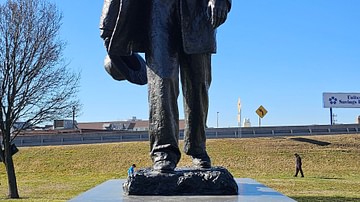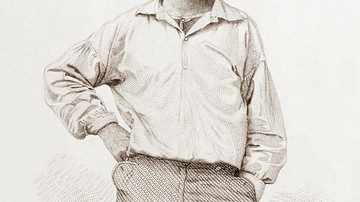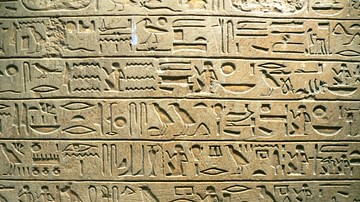
Walt Whitman (1819-1892) was an American journalist and poet, best known for his collection of poems entitled Leaves of Grass, first published in 1855. He remains an influential figure in American literature, whose writings reflect how deeply affected he was by the times in which he lived: "Everything Whitman wrote centered around the notion of democracy" (Mead, 555).
Early Life
Walt Whitman was born on 31 May 1819 in a small village on Long Island, New York. His parents were Walter Whitman Sr. of English descent and Louisa Van Velsor of Dutch-Quaker descent. Both were descended from early settlers on Long Island. Whitman Jr. was the second child and second son. Walt Sr. was a farmer who used his carpentry skills during the city's building boom by moving the family to Brooklyn in 1823. According to Whitman Jr., his father was "always of democratic and heretical tendencies" (Kaplan, 56). Whitman's parents gave him a basic understanding of political liberalism and deistic faith shaped by the teaching of Quakerism. Whitman remained a lifelong liberal.
After leaving school at the age of eleven, he found work at a law firm and doctor's office. Despite little formal education, Whitman was a voracious reader, and aside from the works of Sir Walter Scott (1771-1832), he read 19th-century novels, English Romantic poetry, European classics, and the New Testament. By the age of twelve, he was working in the printing office of a newspaper, the Long Island Patriot, and contributing pieces for publication. He would leave the Patriot, an organ for the Democratic Party, and work at the Star, a Whig newspaper. By the age of 15, he was contributing poems to the Manhattan newspaper The Mirror. In the 1840s, there were between 15 and 20 newspapers in New York – Whitman would work for many of them as either a contributor or editor. At the Patriot and the Star, he had learned the printer trade, a compositor or journeyman printer. But when his family returned to Long Island, he did not; he was on his own, spending his free time at the theater and debating societies. When two fires disrupted the printing industry in 1835, Whitman was forced to return to his family, but despite the hardships, he would not give up his desire to write.
Early Publications
For a while, he tried teaching at local small-town schools. He was hired to yield a "paternal authority" and teach the basics, but at 17, he was younger than many of his students. Although considered a capable teacher, many parents believed him to be lazy for not becoming more involved in after-school activities. But many of his students felt otherwise and were sorry to see him leave, seeing him as both engaging and challenging. Whitman's dream still was to become a writer. At the age of 19, he bought a used press and a case of type, rented a space above a stable, and in June of 1838, he published a weekly newspaper Long Islander. It would later be sold by his financial backers. In 1840, at the age of 21, he moved back to Manhattan and wrote poetry and prose for the Long Island Democrat besides campaigning and even speaking at Democratic rallies at City Hall. In addition, he published The Last of the Sacred Army, one of eight articles he wrote between 1841 and 1842 for the leading Democratic magazine the Democratic Review.
By 1841, Whitman began work at the New York World, a literary weekly as a compositor. Two years later, in 1843, he was the chief editor of the Manhattan daily, the Aurora. He was put in charge of filling the front page with news and editorials, and under his leadership, the paper's circulation increased. Despite the paper's success, Whitman was fired and charged publicly with laziness and an indolent disposition. He soon found work at the Evening Tattler. In November 1842, his temperance novel Franklin Evans or the Inebriate was published. For the next three years, he published not only a number of stories and sketches but also dabbled in politics. In 1845, he returned to Brooklyn for two years where he began to contribute to the Star – assigned to cover special Manhattan events such as musicals and theatrical productions as well as reviewing books – as a result, he became a lover of opera.
By the age of 27, he was the editor of the Brooklyn Eagle, where he wrote literary reviews of such authors as Ralph Waldo Emerson, Thomas Carlyle, Herman Melville, and Johann Wolfgang von Goethe. Politically, he was still a vocal Democrat, initially justifying the Mexican-American War (1846-1848), waged during the presidential term of the Democrat James K. Polk (1845-1849), but his staunch political views caused him to be fired from the Eagle. He opposed the idea of popular sovereignty and became a Free-Soiler, opposed to the acquisition of new territory for the expansion of slavery.
Leaves of Grass
Hoping for newspaper work, he moved to New Orleans in February 1848 to edit the Daily Crescent only to resign in May, returning to Brooklyn. The owners of the newspaper believed that Whitman's politics would present an embarrassment in the upcoming presidential election. With little choice, Whitman left. Upon returning home, he served as a delegate to the Free-Soil convention. With financial support, he published the Brooklyn Freeman, a weekly dedicated to the election of Martin Van Buren and Charles Francis Adams – both opposed to the addition of slave territory.

He spent his time studying and writing, spoke to the Brooklyn Art Union, and even worked as a carpenter. In July 1855, he published Leaves of Grass; the twelve poems were printed in 795 copies by James and Thomas Rome's printing office at Whitman's expense. All of the poems in the 1855 edition, including I Sing the Body Electric, remained untitled until later editions. The longest poem in the collection was Song of Myself. Initially, it would remain untitled until the 1881 edition. In the poem's opening lines, Whitman identified himself with all people when he wrote "I celebrate myself." He is a Yankee, a Hoosier, and a Georgian. "And of these one and all I weave the song of myself." He wrote, "I am young and old, of the foolish as much as the wise … a child as well as a man." (Norton, 2243)
Few copies were sold, and many of the initial reviews were indifferent. Some considered it obscene and impious. One reviewer threw his copy into his fireplace and called it lewd. But there were positives. Ralph Waldo Emerson (1803-1882) wrote to Whitman that it was an extraordinary piece of wit and wisdom: "I greet you at the beginning of a great career" (Norton, 2129). On 10 October 1855, Emerson's letter to Whitman was published in Horace Greeley's New York Tribune. Charles Dana, the Tribune's managing editor, complimented the poem's "bold, stirring thoughts" and its "keen appreciation of beauty" but found its embodiment uncouth and grotesque.
Over the years, Whitman would continue to edit and rewrite Leaves, making eight revisions, expanding the original twelve poems to over 400. Despite the early negative reviews, Emerson's prediction would be proven correct, and by 1871, Whitman was even receiving critical recognition from England. In the preface to Leaves, Whitman wrote: "The proof of a poet is that his country absorbs him as affectionately as he absorbs them" (Whitman, 26).
Drum-Taps
In 1856, Whitman published a second edition of Leaves with 33 poems. Despite the publication of Leaves, he retained an interest in journalism and edited the Brooklyn Times while continuing to write poetry between 1857 and 1859. During the early months of the Civil War (1861-65), Whitman often visited the wounded soldiers recovering in the New York City hospital. When he heard of his brother George lying wounded (only superficially) in Washington, he left immediately. In the city, he volunteered as a wound-dresser at the Armory Square Hospital, caring for the wounded on both sides of the conflict. Listening to the battlefield experiences of the soldiers, he turned his attention to his writing. He wrote the poem Beat! Beat! Drums! in 1861 as a patriotic rally cry for Union soldiers; it would be included in the 1867 edition of Leaves.
In Washington, he worked as a clerk at the Department of Interior but was fired when Secretary James Harlan read Leaves of Grass. Whitman found work in the Attorney General's office. In 1865, he began work on a book of poetry entitled Drum-Taps. On April 17, two days after President Abraham Lincoln's death (l. 1809-1865), Whitman stopped the presses for a poem of mourning Hush'd Be the Camps To-day. After two more years of postponement, he wrote the poems O Captain! My Captain! and When Lilacs Last in Dooryard Bloom'd, both in memory of Lincoln. In both poems, Whitman abandoned his normal free verse and used the more traditional rhyme and meter.
Later Life
After the war, Whitman retained his position with the Attorney General's office in Washington, but as his health began to decline, he lost his clerk position. In September 1871, he read a long poem before the American Institute of New York's annual industrial arts fair. In June of the following year, he gave the commencement address at Dartmouth.
In 1873, Whitman suffered his first stroke, which forced him to move into his brother George's house in Camden, New Jersey. The ever-practical George did not understand his brother's love of writing and considered him shiftless. When George and his wife moved, Whitman bought his first house on Merkle Street in Camden. Despite his failing health, he continued to write and edit Leaves, taking time to write Specimen Days in 1882. The final, deathbed edition of Leaves was simply a reissue of the 1881 edition with two additional poems. On 26 March 1892, Whitman died of pulmonary emphysema; his left lung had completely collapsed. He was buried at the Harleigh Cemetery in Camden.








